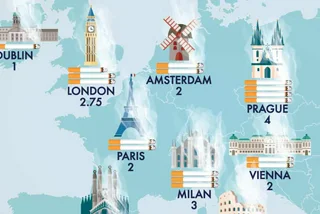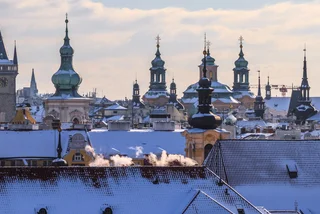Prague has already been named the world’s greenest major city. But in the next few decades, it might be getting even greener.
Within the next 30 years, the Czech Republic’s capital city of Prague could be entirely free of carbon dioxide emissions if local officials are able to agree upon a revolutionary plan.
By 2030, the city has already agreed to reduce CO2 emissions by 45%. The next logical step would be to reduce emissions by 100%, and current Prague officials estimate another 20 years to be able to reach that goal.
“Prague wants to be a healthy metropolis for the 21st century and has committed itself to this, for example, in the Sustainable Mobility Plan, approved by Prague City Council in May 2019,” Adam Scheinherr, Prague’s Deputy Mayor for Transport, stated in a press release.
On Monday, Prague city councillors agreed to further develop a detailed plan for completely eliminating CO2 emissions within the city by 2050. That plan is expected to be delivered by next year.
According to Deputy Mayor Petr Hlubuček, Prague is in part attempting to make up for a Czech government that does not currently respect the Paris Climate Accords.
“A shift from fossil fuels in energy production, transport, and other economic activities is not considered an economic or social threat by Prague, but an opportunity to gradually transform the city into an environmentally friendly metropolis, attractive to life,” he told members of the local media.
An expert commission nominated by the city will now develop an extensive 30-year plan for eliminating CO2 emissions in Prague. Within a year, the commission will deliver a report detailing how the city will adapt.
Certain measures for reducing CO2 emissions in Prague are already being developed by city councillors. Those include a long-debated road tax on all automobiles entering the city that will charge vehicles based on their emissions rating.
According to local officials, the introduction of tolls for vehicles entering Prague is inevitable in the near future. Hundreds of other measures are also in the works.
“There are 242 concrete measures that will gradually contribute to the overall urban traffic calming, electromobility development, and reducing the carbon burden [in Prague],” stated Scheinherr.
“The measures include the possibility of introducing tolls at the entrance to the center of Prague, support for cycling, changing the methods of public transport vehicles or building P+R, metro D, and new tram lines.”
Prague also plans on introducing further incentives for drivers of electric cars, which might include charging stations at some of the city’s public street lamps.
The city also aims to reduce waste emissions and further support measures for recycling. Water from the local Vltava river may also be reused for other purposes – – which could even involve converting it into drinking water.
“Every citizen of Prague should conscientiously interact with the space in which they live and reflect on how to implement measures in their own lives in response to the city’s climate commitment,” says Prague Mayor Zdeněk Hřib.
“It is never too late to start reducing waste production or using more public transport at the expense of passenger cars in the city center. So that we all live well in Prague.”












 Reading time: 2 minutes
Reading time: 2 minutes 

































